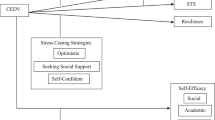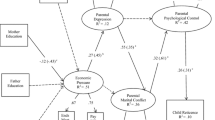Abstract
The relation between political life events and distress was examined with particular emphasis on coping strategies and locus of control as two possible mediators. Subjects were 88 Israeli children. Results partially supported a linear relation between reported impact of exposure and distress. Findings for coping strategies as a mediator suggested, counterintuitively, that greater use of coping strategies is related to more experienced distress. Findings for locus of control as a mediator suggested that subjects with external locus of control experience greater distress, other than in the case of depressive symptomatology. These results indicate that coping strategies and locus of control play a complex role in the stress-outcome relation, the precise nature of which remains to be resolved. Theoretical, clinical and political implications of the findings are discussed.
Similar content being viewed by others
REFERENCES
Bar-Tal, D., Jacobson, D., & Freund, T. (1995). Security feelings among Jewish settlers in the occupied territories: A study of communal and personal antecedents. Journal of Conflict Resolution, 39, 353-377.
Baum, A., Fleming, R., & Singer, J. E. (1983). Coping with victimization by technological disaster. Journal of Social Issues, 39, 117-138.
Ben-Zur, H., & Zeidner, M. (1995). Coping patterns and affective reactions under community crisis and daily routine conditions. Anxiety, Stress and Coping: An International Journal, 8, 185-201.
Bilu, Y. (1989). The other as nightmare: The Israeli-Arab encounter as reflected in children's dreams in Israel and the West Bank. Political Psychology, 10, 365-389.
Boehnke, K., Macpherson, M. J., Meador, M., & Petri, H. (1989). How West German adolescents experience the nuclear threat. Political Psychology, 10, 419-443.
Bowman, G. D., & Stern, M. (1995). Adjustment to occupational stress: The relationship of perceived control to effectiveness of coping strategies. Journal of Counseling Psychology, 42, 294-303.
Canneti, L., Shalev, A. Y., & Kaplan de-Nour, A. (1994). Israeli norms of the Brief Symptom Inventory (BSI). Israeli Journal of Psychiatry and Related Sciences, 31, 13-18.
Charlton, P. F. C., & Thompson, J. A. (1996). Ways of coping with psychological distress after trauma. British Journal of Clinical Psychology, 35, 517-530.
Compas, B. E., Worsham, N. L., Ey, S., & Howell, D. C. (1996). When Mom or Dad has cancer: II. Coping, cognitive appraisals and psychological distress in children of cancer patients. Health Psychology, 15, 167-175.
Conway, V. J., & Terry, D. J. (1992). Appraised controllability as a moderator of the effectiveness of different coping strategies: A test of the goodness of fit hypothesis. Australian Journal of Psychology, 44, 1-7.
Dasberg, H., & Sheffler, G. (1987). The disbandment of a community: A psychiatric action research project. Journal of Applied Behavioral Science, 23, 89-101.
Derogatis, L. R., & Spencer, P. M. (1982). The Brief Symptom Inventory (BSI): Administration, Scoring and Procedures Manual. Baltimore: Clinical Psychometric Research.
Dohrenwend, B. P., Shrout, P. E., Egri, G., & Mendelsohn, F. S. (1980). Measures of nonspecific psychological distress and other dimensions of psychopathology in the general population. Archives of General Psychiatry, 37, 1229-1236.
Elbedour, S., ten-Bensel, R., & Maruyama, G. M. (1993). Children at risk: Psychological coping with war and conflict in the Middle East. International Journal of Mental Health, 22, 33-52.
Erlich, C., Greenbaum, C., & Troublana, Y. H. (1994). Exposure to prolonged stress and sex differences in children's responses to the Gulf War. Psychologia Israel Journal of Psychology, 4, 123-133.
Folkman, S., & Lazarus, R. S. (1980). An analysis of coping in a middle-aged community sample. Journal of Health and Social Behavior, 21, 219-239.
Folkman, S., & Lazarus, R. S. (1983). Folkman-Lazarus Ways of Coping Checklist—Revised. ETS Test Collection, Educational Testing Service, Princeton, New Jersey.
Fricchione, G. L., Howanitz, E., Jandorf, L., & Kroessler, D. (1992). Psychological adjustment to end-stage renal disease and the implications of denial. Psychosomatics, 33, 85-91.
Garbarino, J., & Kostelny, K. (1996). The effects of political violence on Palestinian children's behavior problems: A risk accumulation model. Child Development, 67, 33-45.
Gabarino, J., Kostelny, K., & Dubrow, N. (1991). What children can tell us about living in danger. American Psychologist, 46, 376-383.
Garmezy, N., & Rutter, M. (1985). Acute stress reactions. In M. Rutter & L. Hersov (Eds.), Child and Adolescent Psychiatry: Modern Approaches. Oxford, UK: Blackwell.
Haan, M. (1993). The assessment of coping, defense and stress. In L. Goldberger & S. Breznitz (Eds.), Handbook of Stress, Second Edition. (pp. 258-273). New York: The Free Press.
Harkabi, Y. (1988). Israel's Fateful Decisions. London: I. B. Tauris.
Herman, S. M., & Petersen, A. C. (1996). The protective role of coping and social resources for depressive symptoms among young adolescents. Journal of Youth and Adolescence, 25, 733-753.
Hoffner, C., & Haefner, M. J. (1993). Children's strategies for coping with news coverage of the Gulf War. Communication Research Reports, 10, 171-180.
Horner, K. L. (1996). Locus of control, neuroticism and stressors: Combined influences on reported physical illness. Personality and Individual Differences, 21, 195-204.
Jarrett, S. R., Ramirez, A. J., Richards, M. A., & Weinman, J. (1992). Measuring coping in breast cancer. Journal of Psychosomatic Research, 36, 593-602.
Jensen, P. S., & Shaw, J. (1993). Children as victims of war: Current knowledge and future research needs. American Academy of Child and Adolescent Psychiatry, 32, 697-708.
Johnson, J. H. (1986). Life Events as Stressors in Childhood and Adolescence. Newbury Parks, CA: Sage.
Joseph, S., Cairns, E., & McCollam, P. (1993). Political violence, coping and depressive symptomatology in Northern Irish children. Personality and Individual Differences, 15, 471-473.
Ladd, G. W., & Cairns, E. (1996). Children: Ethnic and political violence. Child Development, 67, 14-18.
Lazarus, R. S., & Folkman, S. (1984). Stress, Appraisal and Coping. New York: Springer Publishing Company.
Lewis, H. A., & Kliewer, W. (1996). Hope, coping and adjustment among children with sickle-cell disease: Tests of mediator and moderator models. Journal of Pediatric Psychology, 21, 25-41.
Meijer, A. (1985). Child psychiatric sequelae of maternal war stress. Acta Psychiatrica Scandinavica, 72, 505-511.
Milgram, R. M., & Milgram, N. A. (1976). The effect of the Yom Kippur War on anxiety level in Israeli children. Journal of Psychology, 94, 107-113.
Pines, A. (1994). The Palestinian Intifada and Israelis' burnout. Journal of Cross-Cultural Psychology, 25, 438-451.
Punamaki, R. L. (1989). Factors affecting the mental health of Palestinian children exposed to political violence. International Journal of Mental Health, 18, 63-79.
Punamaki, R. L. (1996). Can ideological commitment protect children's psychosocial well-being in situations of political violence? Child Development, 67, 55-69.
Punamaki, R. L., & Suleiman, R. (1990). Predictors and effectiveness of coping with political violence among Palestinian children. British Journal of Social Psychology, 29, 67-77.
Rahav, G., & Ronen, T. (1994). Children's perceptions of their behavior problems during the Gulf War. Anxiety, Stress and Coping, 7, 241-252.
Raviv, A., Sadeh, A., Raviv, A., & Silberstein, O. (1998). The reaction of the youth in Israel to the assassination of Prime Minister Yitzhak Rabin. Political Psychology, 19, 255-278.
Reese, F. L., Kliewer, W., & Suarez, T. (1997). Control appraisals as moderators of the relationship between intrusive thoughts and coping. Journal of Applied Social Psychology, 27, 1131-1145.
Rosenbaum, M., & Hadari, D. (1985). Personal efficacy, external locus of control and perceived contingency of parental reinforcement among depressed, paranoid and normal subjects. Journal of Personality and Social Psychology, 49, 539-547.
Rotter, J. B. (1966). Generalized expectancies for internal versus external control of reinforcement. Psychological Monographs, 80, 1 (Whole No. 609).
Rutter, M. (1996). Stress research: Accomplishments and tasks ahead. In R. J. Haggerty, L. R. Sherrod, N. Garmezy, & M. Rutter, (Eds.), Stress, Risk and Resilience in Children and Adolescents. Cambridge: Cambridge University Press.
Salzman, L. (1979). Psychotherapy of the obsessional. American Journal of Psychotherapy, 33, 32-40.
Sarwer, F., & Gerald, J. (1987). Psychoanalytic aspects of obsessive compulsive disorders: Some aspects of anal object relationships in the characterological features of control and possession. Psychiatric Journal of the University of Ottawa, 12, 203-213.
Schwarzer, R., & Schwarzer, C. (1996). A critical survey of coping instruments. In M. Zeidner & N. S. Endler (Eds), Handbook of Coping (pp. 107-132). New York: John Wiley & Sons, Inc.
Slone, M., Adiri, M., & Arian, A. (1998). Adverse political events and psychological adjustment: Two cross-cultural studies. American Academy of Child & Adolescent Psychiatry, 37, 1058-1069.
Slone, M., & Hallis, D. (1999). The impact of political life events on children's psychological adjustment. Anxiety, Stress & Coping: An International Journal, 12, 1-21.
Weisenberg, M., Schwarzwald, J., Waysman, M., & Solomon, Z. (1993). Coping of school-age children in the sealed room during Scud missile bombardment and postwar stress reactions. Journal of Consulting and Clinical Psychology, 61, 462-467.
Zeidner, M., & Saklofske, D. (1996). Adaptive and maladaptive coping. In M. Zeidner & N. S. Endler, Handbook of Coping (pp. 505-531). New York: John Wiley & Sons, Inc.
Zeidner, M., & Ben-Zur, H. (1994). Individual differences in anxiety, coping and post-traumatic stress in the aftermath of the Persian Gulf War. Personality and Individual Differences, 16, 459-476.
Zeidner, M., & Hammer, A. L. (1990). Life events and coping resources as predictors of stress symptoms in adolescents. Personality and Individual Differences, 11, 693-703.
Author information
Authors and Affiliations
Corresponding author
Rights and permissions
About this article
Cite this article
Hallis, D., Slone, M. Coping Strategies and Locus of Control as Mediating Variables in the Relation Between Exposure to Political Life Events and Psychological Adjustment in Israeli Children. International Journal of Stress Management 6, 105–123 (1999). https://doi.org/10.1023/A:1022980310481
Issue Date:
DOI: https://doi.org/10.1023/A:1022980310481




